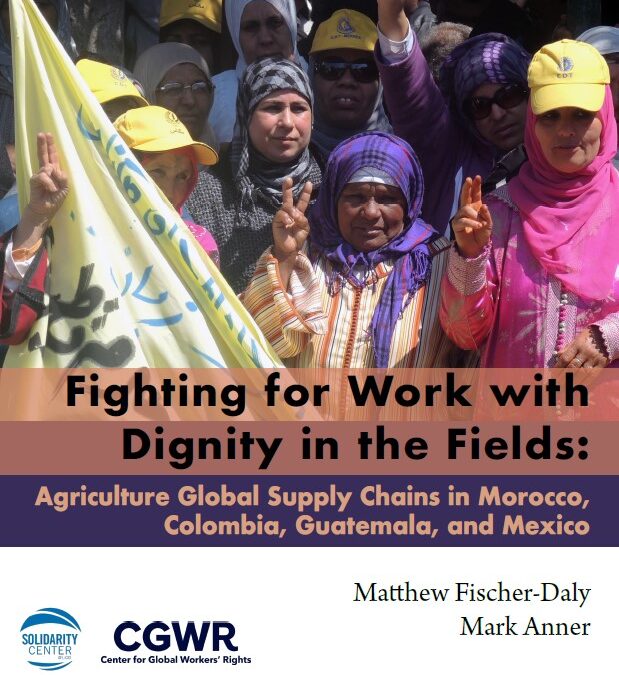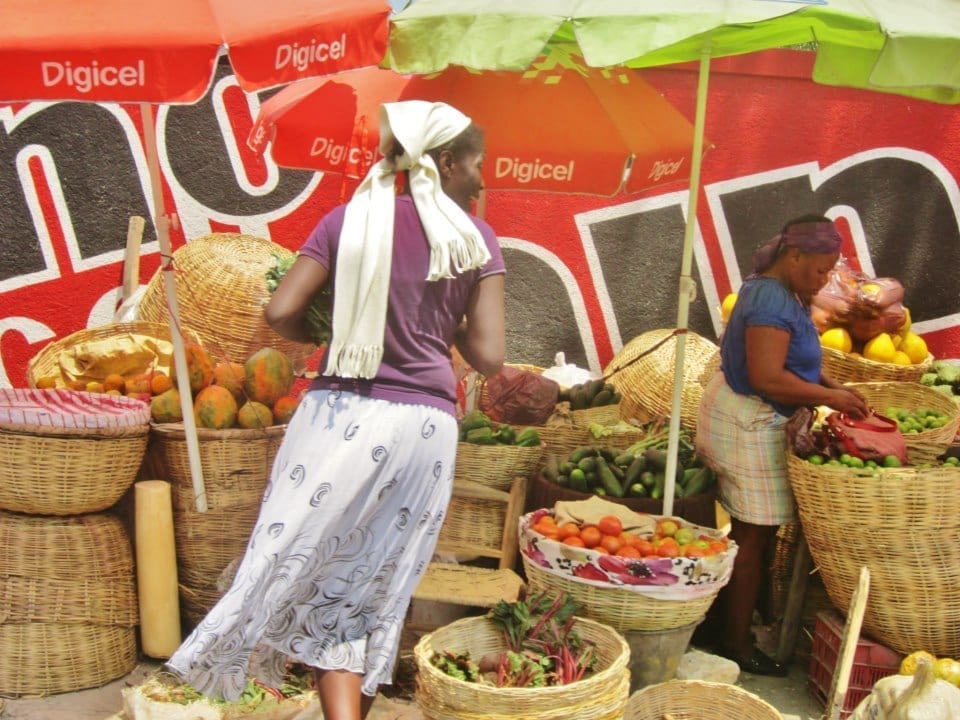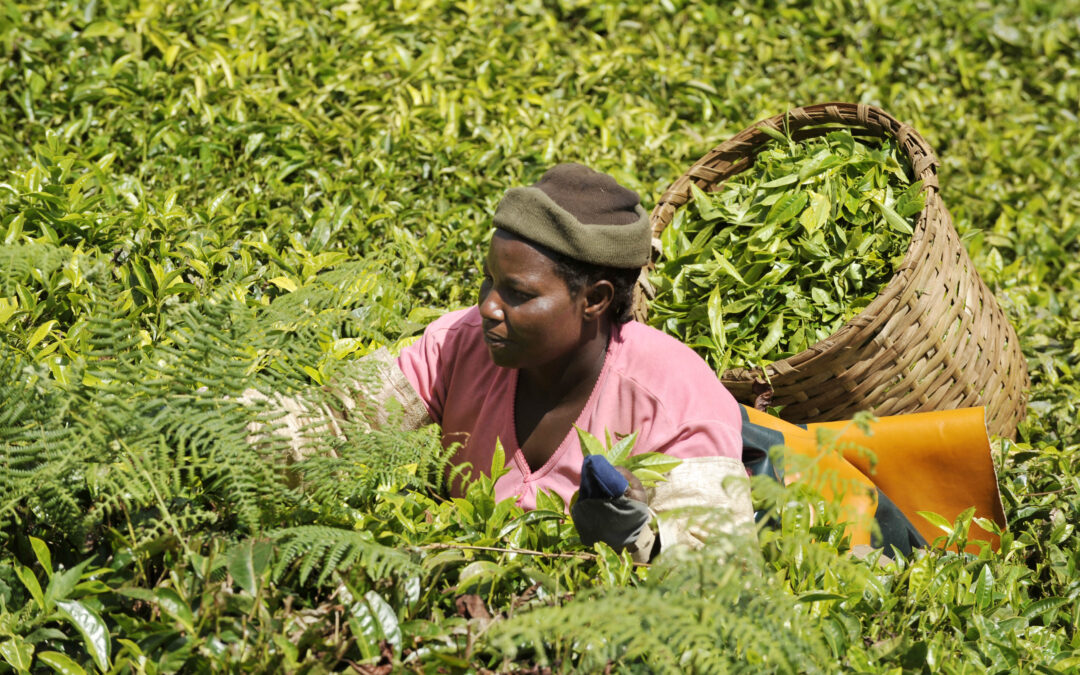
Oct 4, 2021
Where unions establish collective bargaining, they initiate the strongest mechanism for protecting agricultural workers’ rights, health and dignity according to a new report prepared for the Solidarity Center by researchers at Penn State’s Center for Global Workers’ Rights (CGWR).
“Fighting for Work with Dignity in the Fields: Agriculture Global Supply Chains in Morocco, Colombia, Guatemala, and Mexico,” seeks to understand employment relations in agricultural global supply chains and the struggle for dignity and empowerment of workers who are providing the world’s food. The report analyzes five agribusiness sectors including palm oil in Colombia, bananas in Guatemala, strawberries in Mexico, and grapes, olives and wine in Morocco.
In all four countries and five sectors, workers’ collective action has been “almost entirely responsible for increasing respect for workers’ rights” in a context where: 1) governments are constraining worker rights in favor of maximum employer flexibility in support of national, export-oriented development policies and, 2) global retailers are putting downward pressure on wages by curtailing the amount of capital that production workers might negotiate over with their employer for wage increases.
Researchers found that—where established—unions are performing the task of government to protect workers’ legal rights, increasing stability in otherwise precarious employment sectors and providing a mechanism for women to advance gender equality in job status and earnings as well as address rampant gender-based violence associated with their jobs—including transportation to and from the workplace. For example:
- In Colombia, unions negotiated agreements that increased direct hiring by three palm oil production companies, pushing back against the sector’s rampant use of labor subcontracting, which denies subcontracted workers union representation and provides them lower pay and more precarious work.
- In Guatemala, union representation in the banana sector means employer compliance with laws on working hours, remuneration, provision of personal protective equipment, voluntary overtime, protection from sexual abuse and freedom of association.
- In Mexico, while not achieving collective bargaining, the 2015 strike during strawberry harvest compelled employers to increase wages and registration workers in the national social security system, e.g., toward compliance with laws requiring living wages and consistent registration.
- In Morocco, the country’s labor law is enforced in grape, wine and olive oil production due to the agreement secured for workers by the Confédération Démocratique du Travail (CDT).
Addressing inequality and gender-based violence and harassment
Women, who comprise between 50 percent and 70 percent of the informal workforce in commercial agriculture, are especially vulnerable to sexual harassment, physical abuse and other forms of gender-based violence at work. Unions are addressing the gender-based violence that is common in all five sectors studied, as well as gendered pay discrimination and division of jobs that reduces women workers’ earnings, as follows:
- In Guatemala’s banana sector, women workers covered by union contracts report 50 percent less incidence of sexual harassment than peers at nonunion plantations because union women “can inform the company,” a female unionist explained.
- Women in Mexico’s strawberry sector reported that the 2015 strike helped reduce sexual abuse at work.
- While Moroccan law does not prescribe comprehensive equitable treatment, women’s participation in CDT negotiations with Zniber-Diana resulted in clauses requiring equity.
Although union density remains extremely low in all sectors studied, the report concludes that, “[w]here workers are able to unionize and collectively bargain, conditions improve, wages increase and gender-based violence is curtailed,” and that increased union density and collective bargaining coverage will expand these improvements.

Aug 25, 2021
In Nigeria, through a coordinated campaign by the Organization of Trade Unions of West Africa (OTUWA), West African Informal Sector Workers Network Working Group, Federation of Informal Workers’ Organizations of Nigeria (FIWON), Nigeria Labor Congress (NLC) and Trade Union Congress of Nigeria (TUC), unions are demanding increased government investment in healthcare for informal-sector workers and their families—including the provision of adequate hospitals and clinics in marginalized communities.
“Healthcare is a human right!” said FIWON General Secretary Gbenga Komolafe at a press conference in Abuja this month, adding that the COVID-19 pandemic has further exposed Nigeria’s inadequate healthcare system, especially in the informal sector. “We will use all available legitimate means to push this campaign. We will do rallies and protest on the street.”
NLC and TUC representatives at the conference also lent their organization’s support to the campaign.
Although the Economic Community of West African States (ECOWAS) recommends that member states allocate 15 percent of their budget to healthcare, Nigeria budgets only 4 to 6 percent—among the lowest in Africa, said Komolafe.
The region’s signatory governments are required by ECOWAS Fundamental Principles to promote and protect human rights in accordance with the African Union (AU) Charter on Human and Peoples’ Rights—including provision of social protections such as healthcare—but Nigeria’s workers are not adequately covered, said OTUWA Executive Secretary John Odah.
“We now have a responsibility to … call on government to put more funding into social protection, especially healthcare,” said Odah.
OTUWA’s “Healthcare Is a Human Right” campaign, launched in Abuja in March last year, unites OTUWA affiliates in a fight for equal and fair health care access for all who live within the ECOWAS region.
2 billion informal-sector workers comprising 61 percent of the world’s workforce are not covered or are insufficiently covered by laws or working arrangements guaranteed to formal workers. Although informal-economy workers create more than one-third of the world’s gross national product, they have little power to advocate for social security benefits like healthcare, living wages and safe and secure work. By joining in unions or other worker associations, workers in the informal economy can gain the collective power they need to make change, according to an International Labor Organization (ILO) study.

Jul 29, 2021
On this year’s July 30 World Day Against Trafficking in Persons, a coalition of rights organizations including the Solidarity Center are highlighting widespread wage theft perpetrated against Southeast Asia’s migrant workers. Although this form of labor exploitation has been thrown into stark relief during the COVID-19 pandemic, it is a long-standing problem in the region.
“Wage theft is a crime against humanity. If the global pandemic can be overcome, why not wage theft?” says Plantation Rural Education and Development Organization (PREDO) Sri Lanka Executive Director Michael Joachim.
The Justice for Wage Theft campaign is demanding governments address wage theft perpetrated against millions of migrant workers in the wake of the pandemic—including those who voluntarily returned home or were forcibly repatriated, often after employers unilaterally severed their contracts and stopped paying them their earned wages. Many such returnees now find themselves trapped in debt bondage to labor recruiters to whom they owe money on interrupted contracts and, sometimes, for emergency air fare, putting them at risk of labor exploitation. Debt bondage is one of the most prevalent forms of forced labor worldwide.
“The campaign is asking that indebted returnees be protected from exploitation and that migrant workers who returned home in fear for their lives receive their earned wages for work they completed,” says regional migrant rights expert and Solidarity Center Senior Program Officer Miyuru Guansinghe.
The Justice for Wage Theft’s website highlights coalition members’ work and provides a mechanism for collecting wage theft cases and signatures on a public petition for a just compensation mechanism. Coalition members are ASEAN Services Employees Trade Union Council (ASETUC), Cross-Regional Center for Refugees and Migrants (CCRM), Lawyers Beyond Borders, Migrant Forum in Asia (MFA), South Asian Regional Trade Union Council (SARTUC) and the Solidarity Center.
In two reports covering the period December 2019 through June 2021, the campaign documented more than 1,800 wage theft cases perpetrated against people migrating from Bangladesh, India, Indonesia, Nepal, Pakistan and the Philippines to work in agricultural, domestic, construction and other sectors in Bahrain, China, Kuwait, Lebanon, Malaysia, Maldives, Oman, Philippines, Qatar, Saudi Arabia, Sri Lanka and the United Arab Emirates. Volumes 1 and 2 of “Crying Out for Justice: Wage Theft against Migrant Workers” include hundreds of cases identified by the Solidarity Center during direct interviews with affected workers in five Sri Lankan districts.
Wage theft is an indicator of forced labor under International Labor Organization (ILO) standards, says MFA. Under ILO standards, states must develop wage-theft-eradication measures and effective justice mechanisms. Workers are also entitled to effective remedies—including prosecution of employers under criminal law, and payment of earned wages and other compensation, and governments must ensure workers’ wages are paid regularly and a final settlement of all wages is effected upon termination of an employment contract.
Forced labor is the most common result of human trafficking, with an estimated 25 million people trapped in often slave-like conditions. A United Nations report last year found that the percentage of trafficking victims exploited for forced labor is increasing over time and that surveyed countries reported a threefold increase in the number of trafficking victims from 2003 through 2018. Forced labor generates up to $150 billion a year in illegal profits for traffickers—including $51.2 billion made illegally from forced labor exploitation in domestic work, agriculture, forestry, fishing, construction, manufacturing, mining, utilities and other industries, says the International Labor Organization (ILO).
“Human trafficking is a violation that should have no place in civilized society, ” says Saviya Development Foundation Training and Program Director Thushara Senanayaka.
The Justice for Wage Theft campaign is an offshoot of MFA’s regional network of nongovernmental organizations, associations and trade unions of migrant workers, and individual advocates in Asia who are working to protect migrant worker rights and welfare. Such initiatives include efforts in coalition across the globe to improve COVID-19 vaccination access for migrant workers and their family members.
You can support the Justice for Wage Theft campaign by completing its online petition, “Say Yes to Justice!”

Jul 28, 2021
In a global context where most working people and their communities are being denied a say in their future according to the International Trade Union Confederation (ITUC), Kenya’s Central Organization of Trade Unions (COTU-K) is effectively engaging government and policy makers to represent the needs of working people in the development of climate change solutions.
“[N]early nine out of ten countries are… not using social dialogue,” says ITUC General Secretary Sharan Burrow about climate plans submitted by governments under the Paris Agreement on Climate Change. As defined by the International Labor Organization (ILO), social dialogue structures and processes are tools for promoting consensus building and democratic involvement among the main stakeholders in the world of work—representatives of governments, employers and workers—on issues of common interest.
In Kenya, the climate crisis is prompting more frequent and prolonged droughts, erratic rainfall, intermittent flooding, water scarcity and increased incidence of climate change-related diseases—which threaten people’s jobs and livelihoods in all sectors, especially agriculture, fishing, forestry, mining and tourism. Unions, says COTU-K, must take their place at the table to advance worker-centered climate solutions toward a sustainable and thriving future.
COTU-K, a Solidarity Center partner, has successfully represented the interests of Kenya’s most vulnerable citizens in multiple fora and processes, contributing to the country’s Climate Change Response Strategy, the National Climate Change Action Plan, Climate Change Act and, most recently, in the 2020 process of updating Kenya’s Nationally Determined Contributions (NDCs) under the Paris Agreement to include just transition elements. COTU-K is also a member of Kenya’s National Climate Change Council—a body chaired by President Uhuru Kenyatta that advises government on the development of climate change policies and legislation.
COTU-K’s just transition program is rooted in its vision of climate justice, which advocates for a low-carbon development path and actions to address climate change while simultaneously prioritizing the creation of good jobs and ensuring social justice, rights and social protection for all.
“Climate justice [will ensure] that the environmental and social costs of unsustainable production and consumption are met by the economic agents responsible for them,” and prevent the burdens of changes benefiting everyone being placed disproportionately on a few or the most vulnerable, says COTU-K.
The development of climate-related programs and policies requires active and informed public participation, says COTU-K. To this end, COTU-K is pursuing climate-justice coalitions with like-minded organizations, supporting climate and labor justice at both national and county levels of government, and providing worker-to-worker and union-to-union exchanges on effective climate justice strategies.
Jul 15, 2021
A hidden video-surveillance camera discovered on Monday was recording the entrance of the central office of the Confederation of Free Trade Unions of Ukraine (KVPU)—an act described by the organization as illegal and a possible attempt to interfere with trade union activity.
“The KVPU is deeply concerned about possible negative consequences for people, especially for activists and whistleblowers who visited our [Kyiv] office,” says KVPU Chairperson Mykhailo Volynets. Visiting diplomats and politicians may also have been illegally surveilled.
Describing the discovery as “alarming,” KVPU International Secretary Olesia Briazgunova says the organization is demanding a thorough police investigation and the opening of a criminal case.
“A lot of people come here to get legal assistance, discuss trade union activities or inform about corruption,” says Volynets, who fears for those helping KVPU prevent the adoption of draft laws that narrow worker rights in contradiction of international labor standards and those who are highlighting corruption in the coal industry and state-owned transport enterprises.
The recording of people without their consent, except in specific cases established by law, is prohibited by Article 307 of the Civil Code of Ukraine, says KVPU.




